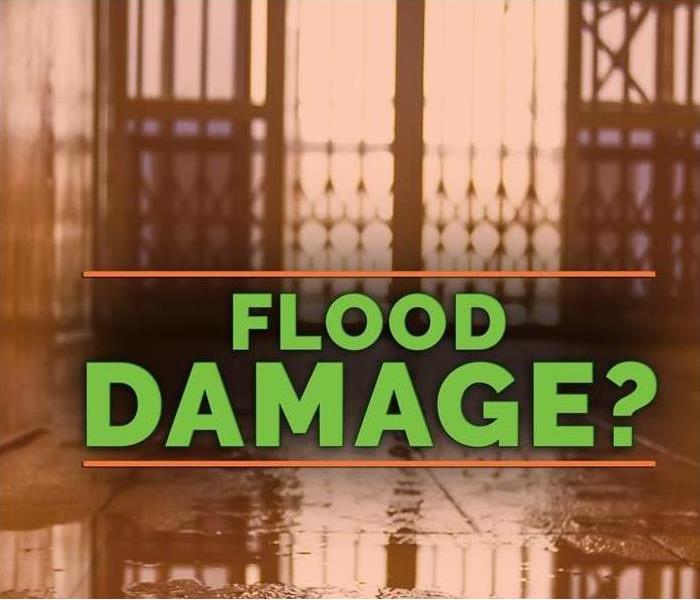"Why should I have flood insurance?"
6/5/2019 (Permalink)
According to the National Flood Insurance Program (NFIP), flooding is the most common natural disaster in the United States, affecting every single state. While hurricanes are mostly responsible for massive flooding catastrophes, other causes of flooding include snowmelt, heavy rain, dams or levees breaking, and new developments impacting water flow. In the past couple of years, many homes that were not in high-risk flood zones experienced flooding simply due to heavy rainfall. In case you didn’t know, your homeowner’s policy will not cover damages caused by flooding. So, purchasing a flood insurance policy is a wise idea even if your home is not located in areas that are more common to flood. Just one inch of flood water in your home can cost thousands of dollars. Flood water is contaminated water and, according to industry cleaning standards, every material affected by flood water must be removed and discarded. Imagine if a few inches of flood water entered your home. Now imagine needing to replace your flooring, sheetrock, cabinets, furniture, clothes, electronics, etc. How much do you think this would cost you? Purchasing a flood insurance policy will save you time and money, helping you and your family recover faster. Well, what do you need to know about flood insurance before speaking to your insurance agent? Below are a few facts about flood insurance and helpful tips to make you a more informed insured.
When should I purchase a flood insurance policy?
Do not wait for hurricane season to purchase a flood insurance policy. The average flood insurance policy takes 30 days to become active. However, according to the Federal Emergency Management Agency, a policy may go into effect sooner:
- If your building is newly designated in a high-risk Special Flood Hazard Area, and you buy flood insurance within the 13-month period following a map revision: One-day waiting period.
- If you buy flood insurance in connection with making, increasing, extending or renewing your mortgage loan: No waiting period.
- If you select additional insurance as an option on your flood insurance policy renewal bill: No waiting period.
- If your property is affected by flooding on burned federal land, and the policy is purchased within 60 days of the fire-containment: Possible waiver of the waiting period.”
But, for the most part, damages from flooding will only be covered after the thirty day wait period. Now is the best time to purchase a policy.
What is covered by a flood insurance policy?
Flood insurance is available to homeowners, business owners, and renters. For homeowners, your flood insurance policy will offer up to $250,000 for repairing the home itself and offer up to $100,000 for replacing personal items and your home’s contents. Business owner policies will offer up to $500,000 for building repairs and $500,000 in building contents. Renters can purchase policies covering up to $100,000 of personal contents.
According to FEMA:
“Building coverage includes:
- The insured building and its foundation;
- The electrical and plumbing system;
- Central air conditioning equipment, furnaces, and water heaters;
- Refrigerators, cooking stoves, and built-in appliances such as dishwashers; and
- Permanently installed carpeting over unfinished flooring.
Contents coverage includes:
- Clothing, curtains, furniture and electronic equipment;
- Portable items such as; window air conditioners, microwaves and dishwashers; and
- Carpeting that is not already included in property coverage.”
Policy prices will differ based upon deductible, the extent of coverages, flood risk, year of building construction, and other factors. The flood insurance market is evolving. Private insurance companies are beginning to offer flood insurance policies now. Speak with your insurance agent to see if you could benefit from purchasing a private flood insurance policy.
How do I purchase a flood insurance policy?
Speak with your insurance agent to learn more about the National Flood Insurance Program and private insurance policies. They should help you to understand which options are best suited for your home and/or business. If your agent does not sell flood insurance, contact the NFIP Referral Call Center at 800-427-4661 for a referral.
What do I do after a flood?
If your home or business has been damaged by flood waters, then please do not enter the property until it is safe to do so. Once you can access your property again, start with contacting your insurance company to file a claim. Then, you can begin to inventory damaged items. Take photographs of everything and write down each item’s purchase date and estimated value. This home inventory list will need to be submitted to your adjuster. Make sure to reach out to SERVPRO as soon as possible to ensure that your home gets cleaned up and back to preloss condition. Also, remember to take notes of your conversations with your insurance company and the adjuster. Jot down the date and time of each interaction, as well as specific notes about what was discussed.
If you do not have a flood insurance policy and your home or business has been damaged due to flooding, then you will be financially responsible for necessary repairs and restoration services. Only if a flooding incident has been declared a national disaster by the president will FEMA assistance become available. This assistance is usually in the form of a grant or low-interest disaster loan that you are required to repay.
The recovery process following flooding disasters is long and emotional. SERVPRO of Spring/Tomball understands the stress and worry you will feel after your home has incurred damages. As your neighbors and your friends, we offer our expertise, guidance, and 24-hour emergency restoration services for those in need of disaster recovery. For questions or to receive assistance please contact our office by dialing 281-374-8172.
For more information about the National Flood Insurance Program or what to do before, during or after a flood you can visit:
https://www.floodsmart.gov/how/what-to-know-before-buying-a-flood-insurance-policy
https://www.iii.org/article/facts-about-flood-insurance
https://www.fema.gov/disaster/4310-4313/updates/facts-and-myths-about-flood-insurance






 24/7 Emergency Service
24/7 Emergency Service
